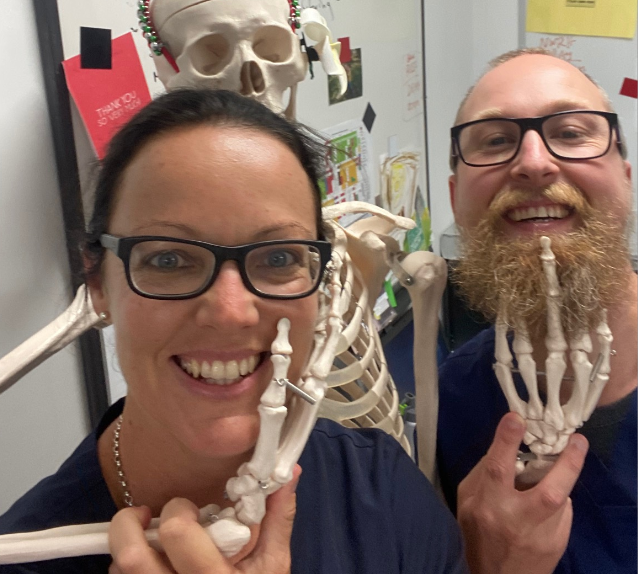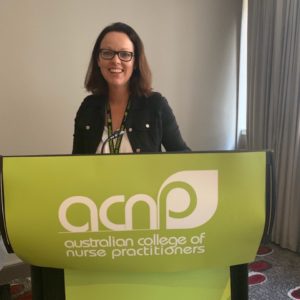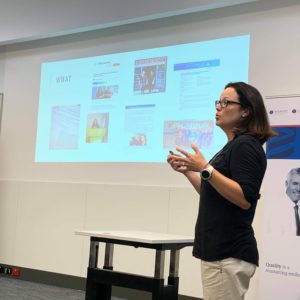Table of Contents
Meet Leahanna Stevens!
She has had an amazing and fulfilling 20+ years career as a registered nurse and 15 years as an Emergency Nurse Practitioner in busy Emergency Department environments across Australia such as the Gold Coast and Tasmania. She has a double Masters in Emergency and has published articles for the Emergency arena. As an experienced Nurse Practitioner who is passionate about healthcare, mentoring and supporting others, she has also developed a new interest for functional medicine; As a side interest and future business plan she recently completed her certification in Applied Functional Medicine for Health Coaching, she is loving this new knowledge.
This area of healthcare investigates more of the true root causes of the Dis-ease in the body then just treating a ‘disease’. After years in the emergency department environment constantly seeing and talking to patients that are frustrated with their chronic conditions, on countless different medications and never really feeling that vitality in their lives, it’s time to consider looking at healthcare a different way.
Tell us about yourself and your journey into nursing.
I grew up playing tennis very competitively at the national level and when I finished high school I had to decide between a scholarship in the USA or stay and make my way in Australia. I’m very close to family and I was too scared to go overseas! So pathetic (insert eye roll) … lol … I had to do something with my life, so I applied for nursing – seemed like a “nice thing to do”, my cousins did it and they looked like they enjoyed what they did.
The rest is history, I stayed and played University Tennis but eventually lost interest in the game and chose to grow my nursing career and have enjoyed every step! I went straight into the ED as soon as possible, there was a waiting list when I first applied so it took about 12 months to get some ward experience but once I was in I was never going anywhere, sometimes you just know you’re in the right place!
What is it about emergency nursing that you love?
I love the team environment and morale in the ED. It’s not always great as it’s stressful and demanding on many levels but we go through so much trauma together the bonds are unbreakable with some of the people you meet, lifelong friends and colleagues. Also the respect we all show each other doesn’t matter if you’re the cleaner, the clerk or the doctor. We all have a sick sense of humour and get through the struggles together.
Can you discuss the ‘atmosphere’ of resus nursing?
You know you’re an ED nurse when you say the ‘atmosphere’ is electric and adrenaline filled. We pretty much love this stuff! I used to say the bloodier the better… However nowadays, I’m more mature than that, I have children, husband, dogs, more responsibility, forcibly wiser and realise that resus is not a good place. Some days I feel sick hearing the call come in because we no longer want to see people fail to come out of there.
So for our students and junior nurses out there – Stop, take a deep breath. If you’re a just go with the flow, listen to the ones that mentor you, it takes time to get the hang of it. We all started at the same place. Just latch on to the nurses who are motivated and want to teach you. Soak it up – go home and cry – it’s ok to do this. Or go out and get shitfaced – it’s ok to do this too!
How do you suggest nurses prevent burnout from the physical and emotional tolls of nursing / ED nursing?
You MUST have a life outside of the ED. The show will go on without you so do not think you must stay for overtime, or work without breaks. Find your passions and go live them. Nursing provides so many travel opportunities (maybe not right now in COVID country) but it will! Go travel, get a hobby, find a side gig, immerse yourself in family and friends or just chillax your way. We must stop and slow ourselves from the sympathetic drive that is the ED. Find some quiet time, relax, zone out, it is so important for our health to reduce stress.
What is an Emergency Nurse Practitioner and how does one become an NP?
ED NPs are awesome! Jack of all trades master of none. I believe you still require a good 3-5 years minimum in the ED – do all the roles – acute/minors/resus/ triage/ paeds/ in-charge/ facilitate/manage etc – experience them all until you truly can say that the CLINICAL work is for you! It’s a clinical role, a clinical lead. You MUST want to learn all things pharmacology and anatomy to become a good NP. Bones will be your new best friend!
What is the day to day role of an emergency nurse practitioner compared to other senior RN’s?
I climb aboard our ED funhsip and start by reviewing a few Xrays and labs, patients from my previous shift to ensure I was on the money with my decisions and all is well. I then start seeing patients. Say hi to the team and then get on with it. My NP role focuses mostly on the Fast Track Minors type patients first. If this is quiet I will help work up a complex patient with blood, Xrays etc or assist in a resus if needed.
The difference to other nursing roles is that I have the skillset and endorsement to click on the patient and be solely responsible for them. Sure, I liaise with the doctors at times but at the end of the day, I work them up, order the investigations, diagnose the problem and address it. Discharge or referral for admission as needed then get them on their way. I take my lunch breaks when I can fit them in, no set times, no set rules, flexibility is my friend. 10 hours a day roster which is fantastic as one less shift at work and one more day at home!
Can you discuss what clinical aspects in particular you enjoy and what your role in the care of these kinds of patients involves?
Our bread and butter is to see and treat a lot of GP / minor injury type of presentations. I love eyes – removing foreign bodies is actually a skill I enjoy doing, I’ve mastered the technique and often called to teach the interns and other NP trainees as they come along. I enjoy the procedural work of our role, a feeling of achievement, such as reducing my fractures and the post-reduction Xrays look so much better! Most of the time (insert eye wink).
I enjoy helping kids with their worried cautious look as they enter the ED – we make it fun and non-threatening. Laceraine is the bomb!! Used correctly it is so effective for these little anxious kidlets, you can literally do stitches with no pain, no trauma for these kids, they walk out smiling with a high five, my job is done! How good is that?!
My workplace is very supportive of the NP role. I work in a regional/rural type ED so my skillset can expand as needed. Requesting pathology, Xrays, doing the suturing, plastering, digital nerve blocks, foreign body removal, x-ray interpretation, abscess incision and drainage, ultrasound skills are all unique to our NP. Role. We are supported to do more in resus like chest drain insertion, art line insertions and intubations were discussed at one point however I’ve not really seen this be required as yet.
The main difference for me is probably just experience. For example – It takes time to learn how to interpret Xrays – I’ve looked at thousands. It’s like ECGs as long as you know what normal is, you have a better chance of picking up when something wrong. Practice practice practice – you will never get it all out of a textbook.
How does nurse prescribing work?
NP prescribing is guided by what the clinical need is and for NPs what is listed on the PBS, this is our bible. An NP is no different to a doctor prescribing, there are some limitations with specific cases and indications but we use exactly the same guidelines like Therapeutic Guidelines or the Australian Medicins Handbook. We write from the same prescription pads (ours are electronic which is fantastic! Minimises errors!) Nurse prescribing can be a different term places use interchangeably, I think that’s more from a standing order point of view and nurse initiated medications.
What is your governance structure like, do you work more closely with the medical team or the nursing team?
NPs is funded mostly from the nursing budget and of course, we are nurses. We report to our Exec Director of Nursing however respectfully and professional clinical issues to our Director of Emergency Medicine. We work well with all, we are part of the team. We have a great relationship. I’m lucky to be here. The doctors are great they are supportive of us and they love having us, I think possibly because we can see a lot of quick easy things much faster than junior doctors, in this facility it is very helpful and we have a high rate of minor presentations so we are pretty busy most of the time. This also frees up their time to focus on the more complex and higher acuity of patients
What is the most rewarding and most challenging aspect of being an NP?
Rewarding: It’s taken a while to get comfortable with the autonomous practice and knowing that I have actually learnt so much of great info over the years. My confidence to stand up for what I know is right practice and advocate for patients with clinical reasoning and justification is rewarding. I can discuss complex patient conditions with any specialist and feel confident in doing so.
Challenging: the limitations put on our practice at times for example: unable to write up workers comp certificates in this jurisdiction which delays patient care and interrupts other clinicians sometimes other clinicians don’t know what I do and what I’m capable of. Lack of inclusion in certain lobby groups, nurses need to be heard and have a voice more so in the political arena, NPs especially as they are often the most experienced clinical nurses out there like CNC’s and CNS’s on the forefront of care.
What are your research interests?
I’ve published 3 articles with the assistance of some exceptional leaders in research. My latest research was around the effectiveness of the ED discharge process and communication of this process within the ED to our patients. We explored the patient’s perception and understanding of the discharge process and if they were happy and prepared to go home. It was interesting work.
What are some common misconceptions by other nurses, the MDT and the public about NP’s
That NPs are nurses with maybe a few extra skills…
A lot don’t realise the potential of the role and the skills we have. I feel at times that some clinicians think we are not qualified and would rather accept a referral from a doctor. Until you develop rapport and trust it can feel this way. It has improved over the years as the NP role is more prevalent in more EDs so other clinicians do meet many on their own journeys.
Like the medical staff, NPs have a different experience so we all are at different levels of our careers. A new NP is like an intern however is often expected to know that of a 10 year experienced NP. It just doesn’t work that way.
In the next 10-15 years, what improvements or what pathway would you like to see the nurse practitioner workforce in Australia take?
Teams working together to design Models for Care and informing the government about whats required – not just doctors doing their thing and nurses doing theirs! Silos need to stop. We should get together and design a team for the actual problem we are trying to fix. What suits the community needs better?
More CNC positions supported to become funded NP positions. For some, a CNC is a waste of skills but I understand a lot of them are not supported to study both financially and time-wise so we must address this issue. An NP is a much better fit on many occasions, can offer more skills and services and provide succession planning and career path for aspiring nurses.
The cost is not that much difference between the two roles. Like many other experienced NPs, we are sick of having to prove ourselves now. The NP role is here to stay, it’s proven to work, let’s accept it and get on with it and work out how we can best fit into the healthcare services so that our communities can get the help they need from whoever is capable of providing it.
What is one thing you wish you would have known before you started your career in this field?
I was one of the trailblazers so it was very tough early on, I cried a lot, I wanted to give up a lot however I stuck with it as intuition told me it will be worth it and that was the right move. I can’t think of anything particular but a better knowledge of anatomy would have been awesome!! Lol
What are some great resources that have helped you along the way?
Nothing beats practical experience, this was passed on to me by a very wise doctor I respected a great deal, he worked with NPs in the UK. You have to just get in there and do it. So I highly recommend the book of practical knowledge! You cant get this stuff out of a book. Listen and draw out as much knowledge from your mentors as possible. Find the ones you gel with and then go for it. Spend time with specialists in their clinics if possible. Talk to the pharmacists, physios, allied health and learn from them. You have to put all these experts knowledge into good use into your own practice
Who are the 3 people who have been most influential to you and why?
Dr Henri Coombs my mentor/support doctor back in the early days – calm, grounded, common-sense approach. He always told me to get out of the books and get in and see the patient – he was so right!
Roger Federer – his utmost professional manner, his calm and cool demeanour with amazing determination to succeed.
My mum – she should have been a nurse. The kindest person on the planet.
What is your leadership style?
Lead by example. Never stop learning, Knowledge is power and will equip you to fight challenges better, feel more confident with your practice and provide excellent care to your patients t. I never get involved in something I don’t know anything about – I don’t pretend to know everything. I’m open to new things and new approaches to healthcare. I respect everyone and treat everyone the same. I support and advocate for our staff, empower others and teach/ share my knowledge as much as possible. You gotta walk the walk to talk the talk.
What are your nonclinical portfolios?
I do love teaching advanced skills to nurses. Xray training has been my baby for years. I’ve taught hundreds of nurses the Nurse initiated Xray package for triage and CIN type roles and along with standing orders. The nurses love it and I love sharing this extended knowledge to empower them.
We ultimately want to set up a training centre of excellence from our ED so this is a really exciting possibility which we are working on my other 2 NP colleagues on.
How can we work better with other health professionals in the multi-disciplinary environment?
Like everything, good communication is key, open, honest and transparent. Most things fail or incidents occur due to lack of communication.
If I was in the executive management office, I would try to facilitate more interdisciplinary meetings so that we all heard what the issues were from everyone. We could brainstorm together to improve efficiencies, solve our specific area problems and all be on the same page. At the end of the day, we are all here for the same reason, the patient. I hate working in single discipline silos… that’s my rant over and out.
Thankyou for having me!
More more information on how to become an NP go HERE
Read our other NP related articles HERE
Looking for our next guest! Are you or do you know of an Aussie healthcare worker/student who would like to write about your/thier area of speciality, unique experiences or other nursing/midwifery/allied health related content then please email Jackson at hello@thenursebreak.org to discuss further or check out the Write for TNB Info Page on the website.











You must be logged in to post a comment.